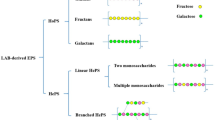Abstract.
Lactobacillus delbrueckii subsp. bulgaricus produces exopolysaccharides (EPSs), which play a role in the rheological properties of fermented food products. Lb. bulgaricus Lfi5 produces a high-molecular-weight EPS composed of galactose, glucose, and rhamnose in the molar ratio 5:1:1. An 18-kb DNA region containing 14 genes, designated epsA to epsN, was isolated by genomic DNA library screening and inverted PCR. The predicted gene products are homologous to proteins involved in the biosynthesis of other bacterial polysaccharides and the genetic organization was found to be similar to that of other eps clusters from lactic acid bacteria. Transcriptional analysis revealed that the 14 eps genes are co-ordinately expressed and transcribed as a single mRNA of 15–16 kb. The transcription start site of the promoter was mapped upstream of the first gene, epsA. Genes encoding glycosyltranferases were further studied by heterologous expression and functional assays. We showed that the epsE gene product is a phospho-glucosyltransferase initiating the biosynthesis of EPS. Heterologous expression of epsE in a LactococcuslactisepsD mutant restored EPS production, demonstrating its role and importance in EPS biosynthesis. Functional assays of other glycosyltransferases allowed their sugar specificity to be elucidated and an overall biosynthetic pathway for EPS synthesis by Lb. bulgaricus to be proposed.
Similar content being viewed by others
Author information
Authors and Affiliations
Additional information
Electronic Publication
Rights and permissions
About this article
Cite this article
Lamothe, G., Jolly, L., Mollet, B. et al. Genetic and biochemical characterization of exopolysaccharide biosynthesis by Lactobacillus delbrueckii subsp. bulgaricus. Arch Microbiol 178, 218–228 (2002). https://doi.org/10.1007/s00203-002-0447-x
Received:
Revised:
Accepted:
Issue Date:
DOI: https://doi.org/10.1007/s00203-002-0447-x




